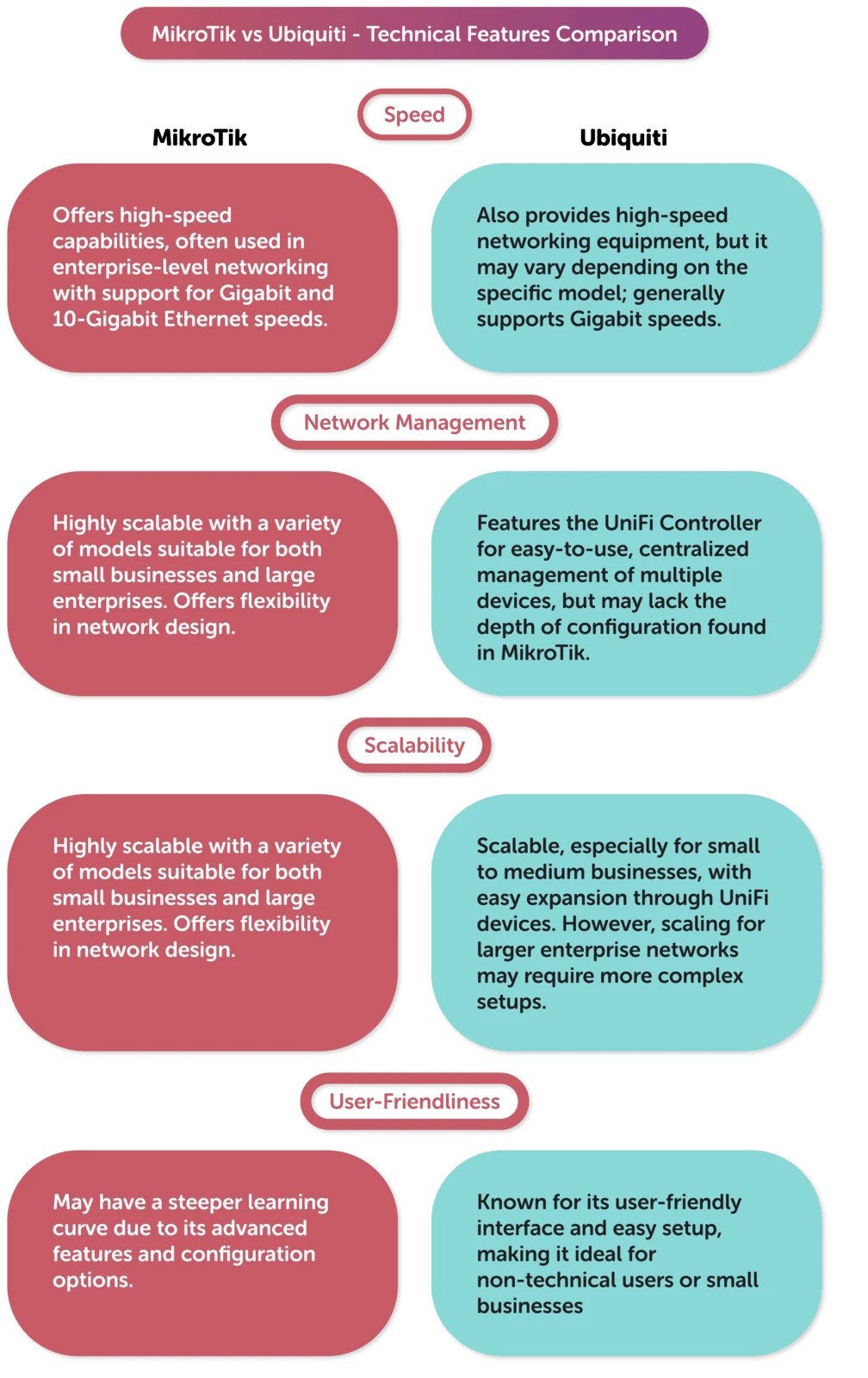When deciding on the best networking solution, the Mikrotik vs Ubiquiti debate often arises, especially among professionals seeking efficient and reliable devices. These brands compete across various categories, including Mikrotik vs Ubiquiti switch, routers, and access points. For instance, comparing an access point Mikrotik vs Ubiquiti reveals differences in affordability, ease of use, and performance. Similarly, the Mikrotik vs Ubiquiti router discussion highlights Mikrotik’s advanced configurability versus Ubiquiti’s user-friendly interface. In enterprise setups, Mikrotik vs Ubiquiti vs Cisco often dominates conversations due to Cisco’s legacy features, but Mikrotik and Ubiquiti stand out for their cost-effectiveness. Whether setting up a Mikrotik vs Ubiquiti point-to-point link or evaluating an access point Mikrotik vs Ubiquiti, the choice depends on network size and specific use cases. From Mikrotik router vs Ubiquiti comparisons to phrases like Unifi vs Mikrotik and Mikrotik vs Unifi, this guide will help you choose the right solution. If you need Mikrotik VPS, visit MikroTik VPS page.
What is Ubiquiti?
Ubiquiti is a global leader in networking technology, offering a wide range of products designed for both home users and enterprises. Known for its user-friendly interfaces, innovative designs, and cost-effective solutions, Ubiquiti delivers high-quality networking gear, including access points, switches, routers, and point-to-point devices. Ubiquiti's flagship line, UniFi, is particularly popular among professionals due to its centralized management, scalability, and seamless integration of multiple devices. This makes Ubiquiti a strong contender in the Mikrotik vs Ubiquiti debate, especially for users seeking simplicity without sacrificing performance.
When comparing an access point Mikrotik vs Ubiquiti, Ubiquiti's UniFi access points stand out for their ease of deployment and intuitive software. They are ideal for environments where seamless wireless connectivity is a priority, such as offices, schools, and homes. On the other hand, Mikrotik offers more advanced configuration options, catering to users who require greater control over their networks.
In the Mikrotik vs Ubiquiti point-to-point category, Ubiquiti excels with its AirMax and AirFiber lines, providing robust, high-throughput solutions for long-distance connectivity. These products are particularly useful for ISPs and businesses requiring reliable wireless links over challenging terrains. While Mikrotik also offers point-to-point solutions, Ubiquiti's focus on user-friendly designs and superior signal quality often gives it an edge.
The Mikrotik vs Ubiquiti access point discussion highlights Ubiquiti's ability to simplify network management. With its UniFi Controller software, users can monitor and control their networks from a single interface, making it a popular choice for beginners and professionals alike. However, advanced users often prefer Mikrotik for its extensive customization options and scripting capabilities.
The ubiquiti vs mikrotik router comparison shows a similar trend. Ubiquiti routers prioritize ease of setup and user experience, while Mikrotik routers cater to network enthusiasts and professionals who require fine-grained control. So, are Mikrotik routers good? Absolutely, but they are better suited for those with advanced networking knowledge.
In debates like UniFi vs Mikrotik or Mikrotik vs UniFi, Ubiquiti appeals to users seeking straightforward, reliable solutions, while Mikrotik attracts those who value advanced configuration. Whether you’re evaluating ubiquiti vs mikrotik for home or business use, understanding your specific needs will help you make the right choice.
What is MikroTik?
MikroTik is a Latvian company specializing in advanced networking equipment and software solutions for professional and enterprise use. Known for its high performance, affordability, and flexibility, MikroTik offers a wide range of products, including routers, switches, and wireless systems, designed to meet the needs of both small businesses and large-scale networks. MikroTik's RouterOS software is a standout feature, providing extensive customization options, routing capabilities, and network management tools. The company’s focus on delivering powerful, customizable solutions makes it a frequent contender in discussions like Mikrotik vs Ubiquiti.
When comparing Mikrotik vs Ubiquiti point to point, MikroTik excels in providing versatile solutions that can be tailored to unique networking requirements. MikroTik's point-to-point products, such as the Wireless Wire series, offer excellent performance and affordability for long-range connections. While Ubiquiti's AirMax products are often favored for their ease of use, MikroTik’s advanced configurability and cost-effectiveness attract tech-savvy users and professionals.
The Ubiquiti vs Mikrotik router comparison highlights the core strengths of MikroTik’s offerings. MikroTik routers are known for their robust feature sets and competitive pricing, making them ideal for businesses and individuals who need advanced routing capabilities. With RouterOS, users can implement complex setups, including VLANs, firewall rules, VPNs, and more. This level of control often surpasses what Ubiquiti routers offer, making MikroTik a preferred choice for advanced networking tasks.
In the Mikrotik vs Ubiquiti debate, MikroTik appeals to users who prioritize flexibility and deep control over their networks. Ubiquiti, on the other hand, is known for user-friendly solutions, making it easier for beginners to set up and manage networks. MikroTik’s devices, while powerful, may require a steeper learning curve, which can deter casual users.
For point-to-point solutions, Mikrotik vs Ubiquiti comparisons often boil down to specific needs. MikroTik's products are highly customizable, allowing users to optimize their setup for unique scenarios. Meanwhile, Ubiquiti provides an intuitive interface, suitable for those who prefer simpler deployment.
Ultimately, the choice between Mikrotik vs Ubiquiti comes down to user expertise and network requirements. MikroTik offers unparalleled control and customization, making it a go-to for professionals, while Ubiquiti appeals to users seeking streamlined, user-friendly solutions. Whether it’s for Ubiquiti vs Mikrotik router setups or point-to-point connections, MikroTik remains a powerful and versatile option for modern networking needs.
Pros and cons of Ubiquiti
Ubiquiti is a popular networking brand known for its user-friendly products, centralized management, and affordability. While its solutions are ideal for many use cases, it's essential to weigh the pros and cons to determine if Ubiquiti is the right fit for your network. This section explores Ubiquiti's advantages and disadvantages and compares it to its main competitor, MikroTik, with the Mikrotik vs Ubiquiti debate frequently arising in networking discussions.
|
Aspect |
Pros |
|
||
|
Ease of Use |
|
Limited advanced configuration options compared to MikroTik |
||
|
Management |
Centralized through UniFi Controller |
Requires familiarity with UniFi ecosystem for optimal use |
||
|
Performance |
Reliable hardware, particularly for wireless access points |
Not as customizable as MikroTik |
||
|
Point-to-Point |
AirMax and AirFiber solutions are user-friendly and high-performing |
May lack some flexibility compared to Mikrotik vs Ubiquiti point to point |
||
|
Routers |
Easy to deploy; suitable for small to medium businesses |
Limited scripting and control compared to Ubiquiti vs Mikrotik router |
||
|
Cost |
Affordable for entry-level and mid-tier devices |
Higher cost at high-end enterprise levels |
Pros of Ubiquiti
1. Ease of Use
One of Ubiquiti's standout features is its simplicity. The devices are designed with user-friendliness in mind, making them accessible to beginners and IT professionals alike. Setting up a Ubiquiti device, such as an access point or router, requires minimal effort compared to brands like MikroTik, which often demand a steep learning curve. This simplicity makes Ubiquiti a preferred choice in discussions like Mikrotik vs Ubiquiti for users prioritizing a quick and easy setup.
2. Centralized Management
Ubiquiti’s UniFi Controller software allows users to manage multiple devices from a single interface. This is particularly beneficial for organizations with complex networks that need streamlined management. Whether you're deploying an Ubiquiti vs Mikrotik router or configuring point-to-point links, Ubiquiti’s centralized system ensures efficient monitoring and troubleshooting.
3. Wireless Performance
In the Mikrotik vs Ubiquiti point-to-point comparison, Ubiquiti excels with its AirMax and AirFiber products, known for their reliability and performance in long-range wireless applications. Ubiquiti’s access points also deliver seamless wireless coverage, making them ideal for both small and large-scale deployments.
4. Cost-Effective Solutions
Ubiquiti is often praised for its competitive pricing, especially for entry-level and mid-tier networking devices. For users comparing Mikrotik vs Ubiquiti, Ubiquiti offers a good balance of features and affordability, making it an attractive option for small to medium-sized businesses.
Cons of Ubiquiti
1. Limited Advanced Features
While Ubiquiti devices are user-friendly, they may not satisfy advanced users who require extensive customization. Compared to MikroTik, Ubiquiti lacks certain advanced scripting and configuration capabilities, which can be a drawback in scenarios where precise control over the network is needed. This is a common discussion point in Mikrotik vs Ubiquiti debates.
2. Dependency on the UniFi Ecosystem
Ubiquiti’s strength in centralized management can also be a limitation. Users must invest in the UniFi ecosystem to fully utilize its features, which may not be ideal for those preferring standalone devices or multi-brand setups.
3. Cost at Enterprise Levels
Although Ubiquiti is affordable for small-scale deployments, its high-end enterprise devices can be relatively expensive. In such cases, competitors like MikroTik may offer more budget-friendly alternatives with comparable or superior features, as highlighted in Ubiquiti vs Mikrotik router comparisons.
When it comes to point-to-point wireless solutions, Ubiquiti’s AirMax and AirFiber products are highly regarded for their performance and ease of use. They provide excellent range and throughput, making them ideal for long-distance links. However, MikroTik’s point-to-point solutions offer greater flexibility and advanced configuration options, which are beneficial for professional users who need to fine-tune their setup. The choice in Mikrotik vs Ubiquiti point to point often depends on whether ease of use or customization is the priority.
Routers are another critical area where Ubiquiti and MikroTik differ. Ubiquiti routers are designed for straightforward deployment, making them suitable for users who need reliable connectivity without extensive configuration. In contrast, MikroTik routers offer advanced features such as scripting, traffic shaping, and VLAN support, making them a better choice for networking professionals. In the Ubiquiti vs Mikrotik router discussion, Ubiquiti appeals to those who value simplicity, while MikroTik is favored for its versatility.
Pros and Cons of MikroTik
MikroTik is a well-known networking brand offering robust, cost-effective solutions for individuals and businesses alike. Renowned for its advanced configuration options and high flexibility, MikroTik is often compared to Ubiquiti, sparking the Mikrotik vs Ubiquiti debate. This guide delves into the pros and cons of MikroTik to help you decide if it’s the right fit for your network needs.
|
|
|
||||||
|
Cost |
Affordable and feature-rich devices |
May require technical expertise for setup |
||||||
|
Customization |
Extensive configuration options and scripting support |
Steep learning curve for beginners |
||||||
|
Performance |
High throughput and advanced routing capabilities |
Can be overwhelming for users needing simple plug-and-play solutions |
||||||
|
Point-to-Point |
Excellent flexibility for long-range wireless links |
More complex setup compared to Mikrotik vs Ubiquiti point to point |
||||||
|
Routers |
Advanced routing features, ideal for professional setups |
Interfaces are less intuitive compared to Mikrotik vs Ubiquiti router |
||||||
|
Ecosystem |
Versatile standalone devices |
Lack of integrated ecosystem like Mikrotik Unifi |
Pros of MikroTik
1. Cost-Effective Solutions
-
MikroTik devices are highly affordable, making them ideal for budget-conscious users.
-
Despite their low price, they offer extensive features comparable to more expensive brands like Ubiquiti, making the Mikrotik vs Ubiquiti cost comparison one of MikroTik’s strengths.
2. Advanced Customization Options
-
MikroTik is renowned for its versatility, offering robust routing, scripting, and traffic management capabilities.
-
Network professionals favor MikroTik for its ability to create tailored solutions, whether configuring MikroTik routers or point-to-point connections.
-
Compared to Ubiquiti, MikroTik excels in granular network control, frequently tipping the scale in the Mikrotik vs Ubiquiti router debate.
3. Performance and Scalability
-
MikroTik devices are designed to handle high-throughput networks efficiently.
-
Their scalability makes them suitable for small businesses and large enterprises, where routing and bandwidth optimization are crucial.
4. Point-to-Point Flexibility
-
MikroTik’s wireless solutions are highly customizable, offering excellent control for long-distance point-to-point setups.
-
While Ubiquiti’s AirFiber may be easier to configure, MikroTik provides unmatched flexibility, a key factor in the Mikrotik vs Ubiquiti point to point comparison.
5. Robust Routing Features
-
MikroTik routers are built for professional environments requiring advanced features like VLANs, QoS, and load balancing.
-
For users comparing Mikrotik vs Ubiquiti router capabilities, MikroTik stands out for its extensive routing options.
Cons of MikroTik
1. Complexity for Beginners
-
The advanced features of MikroTik come with a steep learning curve.
-
Unlike Ubiquiti, which focuses on ease of use, MikroTik requires technical knowledge, making it less beginner-friendly.
2. Lack of Intuitive Interfaces
-
MikroTik's RouterOS interface, while powerful, is not as user-friendly as Ubiquiti's UniFi Controller.
-
Users looking for simplicity often find themselves favoring Ubiquiti, contributing to the popularity of Mikrotik Unifi discussions.
3. Limited Ecosystem
-
MikroTik primarily focuses on standalone devices rather than offering a unified ecosystem like Ubiquiti’s UniFi.
-
For users who prioritize an integrated experience, this can be a significant drawback.
4. Complex Point-to-Point Configuration
-
While MikroTik offers more flexibility in point-to-point setups, its configuration process can be overwhelming for non-experts.
-
This complexity often leads users to prefer Ubiquiti’s simpler AirMax solutions in Mikrotik vs Ubiquiti point to point comparisons.
MikroTik Router Features
MikroTik routers are known for their advanced routing capabilities. With features like dynamic routing, MPLS, and VPN support, these routers cater to professional-grade networks. However, the Mikrotik vs Ubiquiti router debate highlights how MikroTik's robust options may be too advanced for users seeking simple plug-and-play solutions.
In long-range wireless solutions, MikroTik offers unparalleled customization. Its devices are equipped with advanced tools for fine-tuning frequency, power, and data flow. However, this level of detail requires expertise, making Ubiquiti’s plug-and-play AirMax a more attractive option for less technical users.
While Ubiquiti’s UniFi system integrates various networking devices into a seamless ecosystem, MikroTik primarily focuses on standalone products. This difference makes MikroTik better suited for custom network setups but less appealing for users seeking an all-in-one solution.
Similarity between Mikrotik vs Ubiquiti
When comparing MikroTik vs Ubiquiti, both brands offer compelling solutions for networking professionals and enthusiasts. While they cater to different needs, their similarities often make the choice between them difficult. Below, we’ll explore the commonalities across features, functionality, and use cases, organized by categories for better understanding.
|
|
|
||||||
|
Cost-Effectiveness |
Affordable networking devices with professional-grade features |
Competitive pricing with a focus on value |
||||||
|
Versatility |
Wide range of devices for routing, wireless, and point-to-point solutions |
Comprehensive portfolio, including routers, switches, and access points |
||||||
|
Point-to-Point Solutions |
High flexibility and customization for long-range wireless links |
Reliable, plug-and-play options for long-distance connectivity |
||||||
|
Router Functionality |
Advanced routing capabilities for professional use |
User-friendly routers with sufficient advanced features |
||||||
|
Customizability |
Extensive configuration via RouterOS |
Customization through intuitive UniFi software |
1. Cost-Effectiveness
-
Both MikroTik and Ubiquiti provide cost-effective networking solutions, catering to businesses and individuals seeking professional-grade functionality without breaking the bank.
-
Compared to traditional enterprise-grade systems, like Cisco, MikroTik vs Ubiquiti devices stand out as budget-friendly options for networks of all sizes.
2. Versatile Device Portfolios
Both MikroTik and Ubiquiti offer a variety of devices to meet diverse networking needs:
MikroTik
-
MikroTik Router: Known for advanced routing capabilities suitable for complex setups.
-
MikroTik Unifi: While not a direct equivalent to Ubiquiti's UniFi, MikroTik’s standalone devices offer flexibility for tailored solutions.
-
MikroTik vs Ubiquiti Router: MikroTik routers support VLANs, QoS, and advanced traffic control similar to Ubiquiti.
Ubiquiti
-
Offers an integrated ecosystem through its UniFi line, making device management seamless.
-
Competitive with MikroTik vs Ubiquiti router comparisons due to its easy-to-use interface and advanced routing options.
3. Point-to-Point Solutions
-
Both brands excel in point-to-point networking for long-range wireless communication.
-
MikroTik vs Ubiquiti Point to Point comparison often highlights MikroTik’s flexibility versus Ubiquiti’s ease of use.
Common Features for Point-to-Point Solutions
-
Support for high-speed, long-distance links.
-
Advanced tools for bandwidth optimization and interference management.
-
Compatibility with multiple protocols for secure and stable connections.
4. Advanced Routing Features
When discussing routing capabilities, the MikroTik vs Ubiquiti router debate often narrows down to the following common features:
-
Dynamic Routing: Both brands support protocols like OSPF and BGP, essential for large-scale deployments.
-
Traffic Management: Both allow granular traffic control, including bandwidth prioritization and filtering.
-
VPN Support: Secure remote connections are available on both MikroTik RouterOS and Ubiquiti devices.
5. Customization Options
-
MikroTik offers customization through its RouterOS, enabling users to tailor every aspect of the network.
-
Ubiquiti, while simpler, provides customization through its UniFi Controller software, making it comparable to MikroTik’s level of flexibility.
-
This similarity often comes up in MikroTik vs Ubiquiti comparisons, where professionals value configurability.
6. Use Cases
Both MikroTik and Ubiquiti are popular for:
Small to Medium Businesses
-
Affordable networking solutions with professional features.
-
Support for VLANs, firewalls, and QoS.
Enterprise-Level Applications
-
Scalable options for routing, switching, and wireless setups.
-
Reliable performance for complex network infrastructures.
Point-to-Point Connectivity
-
Effective for bridging networks over long distances.
-
Both brands provide competitive solutions, ensuring their devices are frequently compared in MikroTik vs Ubiquiti Point to Point discussions.
Both MikroTik and Ubiquiti share a range of features, making them strong contenders in the networking space. From affordability to versatility, their devices are suited for small businesses, enterprises, and point-to-point setups. Whether you’re evaluating MikroTik vs Ubiquiti router performance or comparing their solutions for long-range connectivity, both brands deliver reliable options. Ultimately, the choice often depends on your preference for deep customization with MikroTik or seamless integration with Ubiquiti.
Mikrotik vs Ubiquiti: Main Diffrences

When evaluating MikroTik vs Ubiquiti, the differences become apparent in terms of design philosophy, target audience, features, and ease of use. This section provides a detailed breakdown of these differences, with insights into their suitability for various use cases. By the end, you’ll have a clearer understanding of which brand best meets your networking needs. If You want to compare between Cisco and MikroTik, read Cisco vs. MikroTik article. Also, For comparing between Mikrotik and Pfsense, read Mikrotik vs. Pfsense.
|
MikroTik |
|
||||
|
Ease of Use |
Requires advanced technical knowledge |
Designed for beginners and professionals alike |
||||
|
Customizability |
Highly customizable through RouterOS |
Limited customization via UniFi Controller |
||||
|
Target Audience |
Network administrators and advanced users |
Small businesses and non-technical users |
||||
|
Cost |
Generally more affordable |
Slightly more expensive for comparable features |
||||
|
Point-to-Point Performance |
Flexible and configurable |
Simplified, plug-and-play solutions |
||||
|
Software Ecosystem |
RouterOS for in-depth configurations |
UniFi for unified device management |
1. Ease of Use: Simplicity vs Complexity
MikroTik
-
Known for its advanced configurability, but it comes with a steep learning curve.
-
RouterOS is highly flexible but requires familiarity with networking protocols and command-line operations.
-
Best suited for network administrators and professionals who need detailed control over their network.
Ubiquiti
-
Designed with ease of use in mind, particularly for small businesses and entry-level users.
-
UniFi Controller provides an intuitive interface for device management, making setup and operation simpler.
-
Ideal for users seeking a plug-and-play experience without delving into complex configurations.
Key Difference: While MikroTik prioritizes advanced features and customizability, Ubiquiti focuses on user-friendliness and simplicity.
2. Customizability and Features
MikroTik
-
Customizability:
-
Offers granular control over network settings via RouterOS.
-
Advanced features like VLANs, QoS, and VPN support are readily available.
-
Features:
-
Comprehensive routing capabilities, making it a favorite for large-scale deployments.
-
Extensive support for dynamic routing protocols like OSPF, BGP, and MPLS.
-
Strong in MikroTik vs Ubiquiti point to point comparisons due to its flexibility.
Ubiquiti
-
Customizability:
-
Limited compared to MikroTik, focusing instead on seamless integration and functionality.
-
Features:
-
Provides straightforward tools for managing access points, switches, and routers.
-
Great for small to medium businesses that value simplicity.
-
Performs well in point-to-point setups but lacks the deep customization MikroTik offers.
Key Difference: MikroTik excels in advanced customization, while Ubiquiti balances simplicity and essential functionality.
3. Target Audience
|
|
|
||||||
|
Advanced Users |
Preferred for its depth and configurability |
Usable, but not as appealing for detailed technical setups |
||||||
|
Small Businesses |
Suitable but requires a professional to manage |
Ideal due to its ease of use and intuitive software |
||||||
|
Enterprise Networks |
Highly customizable for enterprise-scale solutions |
Provides scalability but lacks the complexity MikroTik offers |
Key Difference: MikroTik targets technically proficient users, while Ubiquiti caters to small businesses and general users looking for simplicity.
4. Software Ecosystem
MikroTik
-
RouterOS: A feature-rich operating system offering deep control over networking devices.
-
Extensive scripting support allows automation of network tasks.
-
Suitable for scenarios requiring custom solutions, such as MikroTik vs Ubiquiti point to point setups.
Ubiquiti
-
UniFi Controller: A cloud-based platform for managing multiple Ubiquiti devices from a single interface.
-
Emphasizes integration and ease of management, making it ideal for businesses with limited IT expertise.
-
Limited compared to RouterOS in terms of granular configurability.
Key Difference: RouterOS is for experts, while UniFi Controller simplifies management for less technical users.
5. Hardware Capabilities
MikroTik
-
Routing:
-
Powerful routing capabilities, including support for complex network topologies.
-
MikroTik vs Ubiquiti router comparisons often highlight MikroTik’s advanced routing features.
-
Point-to-Point:
-
Highly flexible configurations for long-distance wireless connections.
-
Preferred in MikroTik vs Ubiquiti point to point scenarios requiring technical precision.
Ubiquiti
-
Routing:
-
Offers reliable routing solutions, but lacks some advanced features found in MikroTik.
-
Point-to-Point:
-
Delivers user-friendly options for point-to-point wireless setups.
-
Plug-and-play functionality appeals to non-technical users.
Key Difference: MikroTik provides greater control, while Ubiquiti focuses on simplicity and streamlined performance.
The MikroTik vs Ubiquiti debate boils down to your networking needs and technical expertise. If you’re a professional seeking maximum control, MikroTik’s advanced features and affordability make it a strong choice. However, for small businesses and non-technical users, Ubiquiti’s user-friendly interface and integrated ecosystem are hard to beat. Whether you’re considering a MikroTik vs Ubiquiti router or comparing their point-to-point solutions, the choice ultimately depends on balancing technical requirements with ease of use.
|
Feature |
MikroTik |
Ubiquiti |
|
Price |
More affordable, budget-friendly solutions |
Generally more expensive, premium pricing |
|
Ease of Use |
Requires advanced networking knowledge |
User-friendly interface, suitable for beginners |
|
Performance |
High customization and performance control |
Optimized for seamless network performance |
|
Scalability |
Best suited for small to medium businesses |
Ideal for enterprise-level scalability |
|
Wireless Capabilities |
Offers strong wired networking features, but less focus on Wi-Fi |
Strong focus on wireless networking solutions |
|
Management Interface |
Command-line and WinBox GUI, requires expertise |
Intuitive UniFi Controller with a visual dashboard |
|
Support & Community |
Active community, but limited official support |
Strong community support and professional services |
Conclusion
In the MikroTik vs Ubiquiti debate, the best choice depends on your specific network needs, technical expertise, and budget. MikroTik stands out for its advanced configurability, affordability, and powerful routing features, making it a favorite among experienced network administrators and professionals handling complex setups. In contrast, Ubiquiti excels in user-friendliness, sleek design, and seamless integration, catering to small businesses, beginners, and those seeking a plug-and-play solution. For point-to-point connections, MikroTik vs Ubiquiti point to point comparisons reveal that MikroTik offers greater flexibility, while Ubiquiti simplifies deployment. When comparing routers, MikroTik vs Ubiquiti router highlights MikroTik’s robust performance for large-scale networks versus Ubiquiti’s intuitive UniFi system for streamlined management. Ultimately, both brands have distinct strengths, and your decision should align with your technical requirements and network goals. Whether it’s affordability or ease of use, MikroTik and Ubiquiti both deliver reliable solutions tailored to different user needs.





![What Is Cold Data Storage? ❄️ [2026 Guide] What Is Cold Data Storage? ❄️ [2026 Guide]](https://1gbits.com/cdn-cgi/image//https://s3.1gbits.com/blog/2026/02/what-is-cold-data-storage-750xAuto.webp)
![What Is Virtual Desktop Infrastructure? 🖥️ [VDI Explained] What Is Virtual Desktop Infrastructure? 🖥️ [VDI Explained]](https://1gbits.com/cdn-cgi/image//https://s3.1gbits.com/blog/2026/02/what-is-virtual-desktop-infrastructure-vdi-750xAuto.webp)



